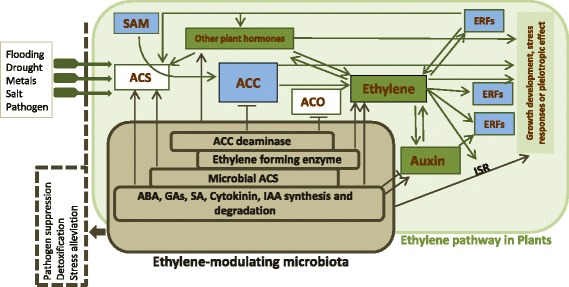Fig. 2.

A holobiont-level regulation of ethylene signaling and plant stress response. Ethylene pathway in plants (green area). ACC (1-aminocyclopropane-1-carboxylic acid) is synthesized from SAM (S-adenosylmethionine) by the action of ACC synthase enzyme (ACS). ACC is then converted to ethylene by the enzyme ACC oxidase (ACO), triggering different ethylene response factors (ERFs). Plant-associated microorganisms can alter virtually all steps of ethylene signaling. Some species can increase ethylene levels by producing ACC oxidase (microbial ethylene-forming enzyme), by inducing ACC synthase in plant or by affecting other plant hormones indirectly. They can also modulate ethylene response by producing plant hormones that interact with ethylene signaling [62, 83, 84]. Other microorganisms can also decrease ethylene production by cleaving its precursor ACC. White boxes show ethylene biosynthetic enzymes, green boxes show plant hormones and signals, and blue boxes show the molecules involved in the ethylene pathway. ABA abscisic acid, GA gibberellic acid, SA salicylic acid
